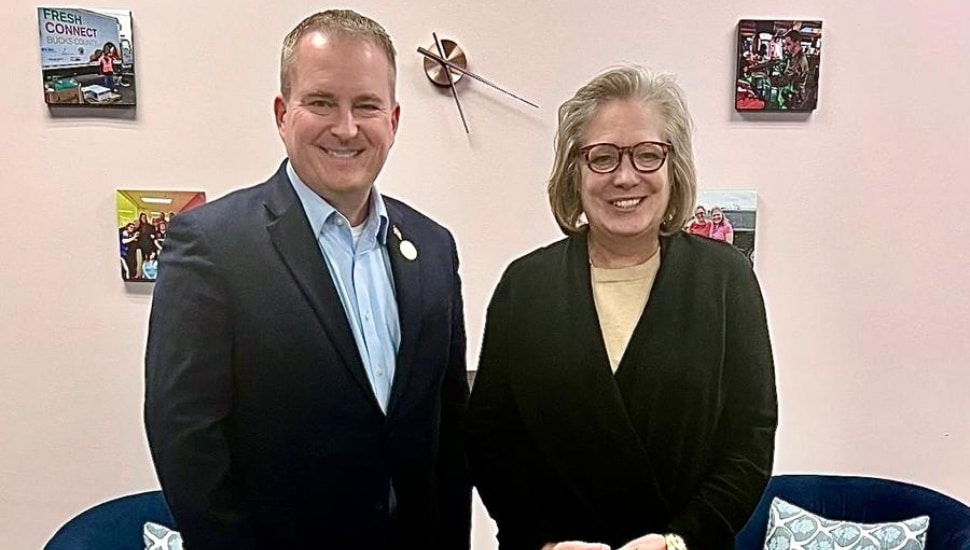State Representative Brian Munroe visited the newly renovated Shared Wellness Center in Warrington earlier this month praising the center for creating inclusive spaces and building community using mindfulness principles and promoting mental, emotional, and physical well-being.
“This investment not only enhances access to wellness resources but also creates new opportunities for employment and community engagement. By fostering a healthier, more resilient population, Shared Wellness is contributing to the ongoing growth and prosperity of our district,” Munroe said in a statement.
Shared Wellness Center is the home of the Shared Wellness network focused on providing individuals with intellectual and developmental disabilities with clinical services and integrated support systems. The center focuses on mind and body offering self-care strategies and mindfulness practices inspired, within a trauma-informed care environment.
Christine Martin, President and Executive Director of Shared Wellness, said the center will be based in Polyvagal Theory, which emphasizes the role of automatic nervous system plays in regulating health and behavior. She said “the importance of place was essential” to avoid creating a triggering environment.
The center, painted in soothing colors and water features, offers services and activities like yoga, meditation, sound baths, aromatherapy, massage chairs, art workshops, cooking classes, and gathering spaces.
“You can’t help someone be mindful, you can’t help someone self regulate if the environment has triggered them. So if you have an environment that is very soothing, you’re starting out on the right foot,” Martin said.
During the day the funded programs will be for people with intellectual disabilities referred to the center for its services. In the evening, the center will offer yoga classes, sound baths, and community spaces for the public to use.
To expand their services into the Warrington community, Shared Wellness conducted focus groups with community members more likely to experience trauma and difficulties like veterans, first responders, and single mothers, who said having a space to meet friends and hang out would be beneficial. Rep. Munroe, who toured the facility and met with Shared Wellness staff, understood the importance of community and access to wellness services as a firefighter himself.
“We realized we need a space for them, because, again, connection and reducing isolation, that is wellness,” Martin said. “So everybody’s wellness is different, right?”
Rep. Munroe’s encouragement and ideas for the center’s community outreach are the beginning steps of communicating and connecting with residents about their wellness, Martin said.
The 14,000 square foot center has approximately 300 employees, but Martin says they are hoping to bring on more full time practitioners for the programs and community services offered. She said connecting with the wellness community is important for building a group of practitioners willing to offer their services and finding employees who have experience with practicing mindfulness.
Martin emphasized the importance of mindfulness strategies in people with anxiety disorders and PTSD, saying studies “show conclusively that mindfulness approaches are literally better than medication.”
“It’s like, I’m gonna learn how to get through my day in a positive way. I’m gonna take responsibility. I can do this. And when you feel as though you can manage your own emotions and self regulate, you’re empowered,” she said.
Before opening the center, which has become Shared Wellness’ home base, they provided different levels of residential services to their clients. At the first level is community living arrangements (CLA) is offered in a residential setting where highly trained staff assist in daily tasks. At the second level, Lifesharing, individuals live with a caregiver providing support. At the third level, Martin said they offer Supported Living where people need 30 hours or less of support. Each person receives customized assistance with budgeting, meal preparation, household management, and accessing community resources.
The trauma-informed care services provided by Shared Wellness have grown into what they call “their network of care.” Martin says she has seen the benefits of trauma-informed care and providing people with intellectual and developmental disabilities, who are disproportionately impacted by traumatic events, with the tools to self-regulate.
“The targeted behaviors have reduced, and we see the biggest outcome in the reduction of hospitalizations,” Martin said. “And I just have to think that it’s everybody working together around connection, clinical approaches, expanding the clinical approaches.”
As Shared Wellness continues to expand their services, they’re focused on their next projects which include renovating their administrative building, introducing psychiatric rehabilitation services. Martin said they would love to add more wellness centers, too.
“I’d like this to be accessible for many neighborhoods, we’ve had other providers come out who are interested, and we, you know, we’re sharing our ideas so they can take it back to their place and maybe create something there,” Martin said.







